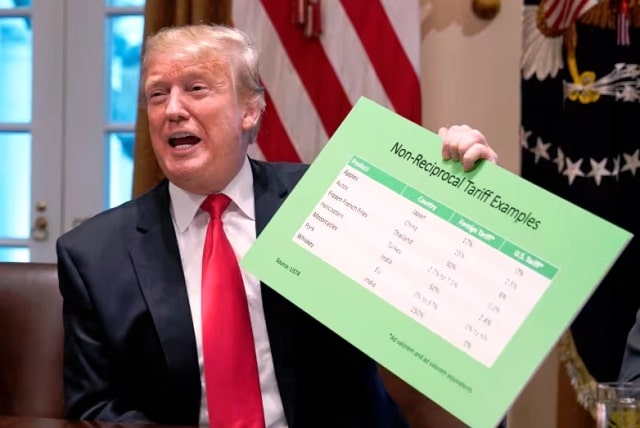
Trump, Tariffs & The Turmoil
Donald John Trump in his second term as the occupant of the White House has dropped enough hints that he will be an altogether different self from what the world knew about him during his first Presidency. If he has disappointed many of his allies by the kind of intervention in the nearly three-year Russia-Ukraine war and the Hamas-Israel conflict in Gaza, his other diplomatic initiatives in the first few weeks of accession to power such as his stated ambition on Canada and Greenland and a thoughtless Rivera like project at Gaza by way of total displacement of Palestinians.
All these grandiose ideas of President Trump have expectedly met with strong disapproval and derision from across the world. How on earth could Ukraine accept US support in exchange of granting 50 per cent interest to America in all its minerals, including rare earth! Those foreign leaders who have considered Trump to be a “good friend” have by now realised that the US President will not concede anything, including trade access to American market unless he gets what he wants.
The world, much to its disappointment, is seeing the US, which is the world largest economy and mightiest military power, rapidly embracing raw, unrestrained capitalism under the second-term Presidency of Trump abandoning all traces of egalitarianism. Induction of Tesla chairman Elon Musk to head the department of government efficiency (DOGE) with the stated purpose to eliminate excessive and fraudulent federal spending and also rid the prevailing system of “dispensable regulations” is a clear indication of the US embracing laissez-faire in its bawdiest form.
The Trump Administration decision to gut the USAID (United States Agency for International Development) is harming global campaign against HIV, polio, mpox and bird flu, and depriving millions of women and girls in poor countries of support. As it shows the US in poor light in the rest of the world, it has caused shock and despair to the Agency’s more than 10,000 employees.
Musk who showed no mercy in getting rid of employees at Twitter following his $44 billion acquisition in 2022 who were not ready to share his “extremely hardcore vision” is going about the job of purging federal bureaucracy eliminating thousands of jobs in his role at DOGE. Taking away jobs in this buccaneering way has caused revulsion both within and outside the US. For all that is happening, attorneys general of a number of states have filed lawsuits in Washington, D.C. alleging the President has given Musk “unchecked legal authority without Congressional authorisation.” They have gone as far as calling Musk “an agent of chaos” in the government.
Reforms of the federal administration bearing Trump-Musk seal is one strand of “Make America great again (MAGA)” campaign that Donald Trump actually borrowed from President Ronald Regan. Regan used the slogan with great effect during the 1980 presidential campaign. The US economy was then down suffering from stagflation and the Regan call for “Let’s make America great again” invoked patriotism among the masses helping in his winning the election. Trump’s identical clarion call with deletion of the word “Let’s” wrung a chord with large sections of Americans as the outcome of the elections showed.
Whatever Trumpism is all about, it betrays a sense of white supremacy, though understated. This equates normality with ‘whiteness’ while mimicking the norms of fairness, justice and equality. How there is a racial streak in the MAGA philosophy will be illustrated by nothing short of a vile campaign against the foreign-born workers by selectively citing data from the US Bureau of Statistics.
ALSO READ: There Is A Nazi At The Table
The Bureau says over the past year the native-born Americans lost 773,000 jobs, while foreign-born workers secured 1 million jobs. This provided enough fuel to rabidly right-wing economists and sections of media to moan about native-born Americans being regularly edged out in the job market by foreigners who are here to seek their fortune. As they remain hooked to the “great replacement theory,” they are particularly gunning for Indian immigrants who continue to do particularly well in the IT industry, thanks to their education and innovative skills. Such is their depth of knowledge and entrepreneurial skills that quite a few of Fortune 500 companies, including some IT behemoths are led by people of Indian origin.
In what the other day came as a shock to champions of free trade across the globe was the Trump Administration ordering a 25 per cent import tax on all steel and aluminium entering the US, ending exemptions earlier given to allies, including Canada and the European Union. As the move amounted to raising trade barriers, quite expectedly Canada, which has the biggest share of US steel and aluminium imports, reacted strongly to the US impost. Canadian prime minister Justin Trudeau said he would “stand up” for his country’s workers and businesses in all situations. “Firm and proportionate countermeasures” to the duty would follow was how the European Commission president Ursula von der Leyen reacted.
The response of the rest of the world to US tariff change cannot but be sharp since that country happens to be the world’s single largest importer of steel with Canada, Brazil, Mexico and South Korea being the four major suppliers. Even while the new duty is perceived as an act against liberal trade, the President has no compunction in saying: “Our nation requires steel and aluminium to be made in America and not in foreign lands.” People see in Trump’s statement: “This is a big deal; the beginning of making America rich again,” the warning of many such tariffs being proclaimed to clear the way for “our great industries to come back to America.”
As is his wont, President Trump has remained unfazed by universal criticism of new imposts on the two metals. The next round of similar tariffs could be targeted at pharmaceuticals and computer chips. No question, Trump is out to play the tariff card to protect jobs for the Americans by shielding local industries from foreign competition and raise tax revenue. The threat of what he can do with tariff will come handy for the President to use that as a lever in trade negotiations. Our prime minister could not have missed the point during his visit to the US.
What Trump is not ready to accept is that tariffs of the kind he is promoting will hurt domestic consumers. He is on record saying prices may go up for some time but “ultimately they will be cheaper.” Steel and aluminium are the two commodities, which find application from infrastructure building to construction of all kinds to large household appliances. Shutting out imports is no guarantee that local manufacturers of aluminium and steel will see efficiency improvement. In fact, the mounting trade barriers likely to restrict imports and therefore, overall supply will be a temptation for local producers to demand higher prices for aluminium and steel products. We have seen that happening during Trump’s first term. The President may think tariffs are not a tax on Americans and as a result they are not going to pay a price for that. But it works out differently and the Americans will find it sooner than later.
India is the world’s second largest producer of both aluminium and steel after China. Out of India’s aluminium production of 4.15 million tonnes, it exported 200,000 tonnes in 2024 to the US. In the case of steel, Indian exports to that market amounted to some 95,000 tonnes out of a production of 145 million tonnes. Ministry of Steel secretary Sandeep Poundrik doesn’t think the new US tariff would be hurtful for the Indian producers, for their exports to that market is a tiny bit of total output. To the extent global exports of aluminium and steel to the US will shrink once the new tariff goes online, supplies in other markets, particularly the EU will rise. So competition in such places will intensify. That will hurt India. And then as president of Indian Steel Association Naveen Jindal says: “The domestic industry needs to be on guard as countries exporting to the US may divert shipments here after the imposition of tariffs.”



